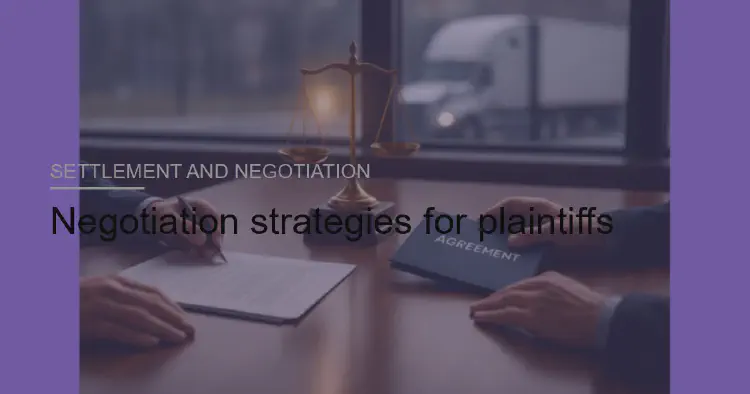Negotiation strategies for plaintiffs
Because most truck accident cases are resolved through settlements, plaintiffs and their attorneys must use strong negotiation strategies to maximize recovery while avoiding unfair compromises.
- Truck Accident Law Team
- 2 min read
Article 3 of 6 in Settlement and Negotiation/

Negotiation Strategies for Plaintiffs in Truck Accident Settlements
1. Establish a Strong Case Foundation
- Gather and organize police reports, ELD data, black box records, maintenance logs, and medical records.
- A well-documented case increases leverage during negotiations.
2. Calculate Full Damages Before Negotiating
- Include not just medical bills but also lost wages, future earning capacity, pain and suffering, and long-term care costs.
- Use experts (medical, economic, vocational) to support claims with credible estimates.
3. Start With a High but Reasonable Demand
- Opening settlement demands should reflect the maximum fair value of the case.
- Allows room for compromise while anchoring negotiations in the plaintiff’s favor.
4. Anticipate Defense Tactics
- Be prepared for insurers to delay, deny, or downplay injuries.
- Counter with documentation and expert testimony.
- Recognize common insurance tactics such as lowball offers.
5. Use Timing Strategically
- Settlement discussions may be more productive after key evidence is revealed during discovery.
- Deadlines for trial often pressure defendants into more serious offers.
6. Consider Mediation
- Mediation provides a structured environment with a neutral facilitator.
- Shows willingness to resolve disputes fairly but also demonstrates strength by being prepared for trial.
7. Maintain Litigation Readiness
- Always signal readiness to proceed to trial if offers are inadequate.
- Defendants are more likely to settle fairly when they believe the plaintiff’s attorney is prepared to litigate aggressively.
8. Communicate Client Impact Clearly
- Personalize damages by showing how the accident disrupted the victim’s daily life.
- Emotional narratives can influence both insurance adjusters and potential jurors.
Summary: Plaintiffs maximize settlement value by building strong evidence, calculating all damages, starting with a reasonable but firm demand, and staying prepared for trial. Effective negotiation balances legal strategy, timing, and clear communication of the accident’s human and financial toll.
You might also like:
- Tags:
- Black Box
- Expert Testimony
- Police Reports
- Maintenance Logs
- Medical Records
- Strong Evidence
- Pain Suffering
- Eld Data
- Lost Wages
- Insurance Adjusters
- Earning Capacity
- Settlement Value
- Medical Bills
- Settlement Discussions
- Key Evidence
- Term Care
- Accident Settlements
- Support Claims
- Defense Tactics
- Negotiation Strategies
- Records Maintenance
- Plaintiff Attorney
- Truck Accident Settlements
- Data Black Box
- Police Reports Eld
- Reports Eld Data
- Records Maintenance Logs
- Lost Wages Future
- Eld Data Black
- Documentation Expert Testimony
- Future Earning Capacity
- Wages Future Earning
- Logs Medical Records